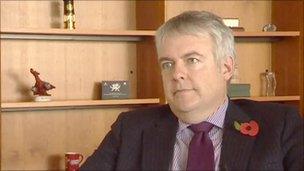Cuts likely as Welsh budget spelled out
- Published

The Welsh Assembly Government's draft budget for 2011-12 will be published
Wales will learn the full impact of the economic squeeze as the assembly government lays out its budget plans for the next financial year.
It follows the UK chancellor's Spending Review, which means the assembly government must find ways to cut £400m.
The draft budget, which funds services like the NHS and education, will outline plans to distribute £14.6bn, but cuts are expected in some areas.
Budget Minister Jane Hutt said the draft budget will be "fair and just."
The budget which will be revealed on Wednesday afternoon, funds devolved responsibilities including health, education, transport and local government.
Ms Hutt said: "We're going to do what we can - of course we can't do everything.
"We'll have to reprofile, we'll have to consider what we reduce, what we rescale...
"But I believe we have got a fair and just budget and we are going to mitigate the worst impacts of this UK government spending review for the next few years."
The assembly government's budget grew year on year from 1999/00, when it was £7bn, to a cash high of £15.2bn in 2009/10.
With inflation factored in Welsh ministers say the real cut will be closer to £860m.
Capital programmes like roads, schools and hospitals will face a 41% cut over four years, and a 25% cut in the next financial year alone.
Revenue funding, which pays for public sector staff, will remain static in cash terms next year, and rise very slightly between now and 2014-15.
But the effects of inflation will mean job cuts will be hard to avoid.

First Minister Carwyn Jones said budget priorities will be made
Assembly government ministers say they are drawing up the budget during the most difficult and challenging times for a decade.
They say they are focused on protecting the most vulnerable and have listed schools, skills and hospitals as policy areas to prioritise in the budget.
They have also committed to protect the universal benefits the assembly government controls, such as free prescriptions and free school breakfasts.
But the assembly government cannot protect welfare benefits, such as housing benefits or those for unemployed people, from cuts as those budgets are set at Whitehall on a UK basis.
Conservative call
The Welsh Conservatives want the assembly government to protect health spending from cuts as the UK government has pledged to do in England.
Their leader Nick Bourne said: "We're absolutely convinced that we can make the savings elsewhere, just as they're doing at Westminster.
"It's a question of priorities. I wish they'd change their priorities, they want me to change mine.
"But as far as I'm concerned, as far as my party's concerned, health is the number one priority for Wales."
The argument against exempting health from cuts is that such protection would make the cuts sustained by other departments - agriculture, heritage, local government, for example - that much bigger.
Steve Thomas, chief executive of the Welsh Local Government Association, said he did not think ring-fencing health makes sense.
Mr Thomas said: "I think that's a very strange suggestion to make in the Welsh context, I have to say.
"I think the fact that the health budget in a Welsh context accounts for nearly one half of the assembly spending means that everything else would be decimated if we ring-fenced that."
'Pupil premium'
The Welsh Liberal Democrats have called on the government to introduce a 'Welsh pupil premium' as part of the budget.
They say this could be targeted at children who receive free school meals initially, before later being more accurately targeted through the tax system.
Welsh Liberal Democrat Leader Kirsty Williams said: "The Labour-Plaid Government has consistently underfunded our schools.
"Education spending in Wales is over £500 lower per pupil than in England and sadly, this is now reflected in Wales' poorer performance at GCSE and A level - where we have now slipped behind England for the first time.
"It is vital that in Wales we begin to close this funding gap, starting with children from the poorest backgrounds."
- Published17 November 2010
- Published13 November 2010
- Published11 November 2010
- Published20 October 2010